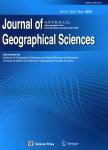A review of fully coupled atmosphere-hydrology simulations
陆面水文—气候耦合模拟研究进展(英文)作者机构:Ministry of Education Key Laboratory for Earth System Modeling Department of Earth System ScienceTsinghua University Joint Center for Global Change Studies Key Laboratory of Water Cycle and Related Land Surface Processes Institute of Geographic Sciences and Natural Resources Research CAS University of Chinese Academy of Sciences
出 版 物:《Journal of Geographical Sciences》 (地理学报(英文版))
年 卷 期:2019年第29卷第3期
页 面:465-479页
核心收录:
学科分类:07[理学]
基 金:National Key R&D Program of China,No.2017YFA0603702 National Natural Science Foundation of China,No.41571019,No.41701023,No.41571028 China Postdoctoral Science Foundation,No.2017M610867
主 题:land surface hydrology regional climate model fully coupled atmosphere-hydrology simulation water cycle research review
摘 要:The terrestrial hydrological process is an essential but weak link in global/regional climate models. In this paper, the development status, research hotspots and trends in coupled atmosphere-hydrology simulations are identified through a bibliometric analysis, and the challenges and opportunities in this field are reviewed and summarized. Most climate models adopt the one-dimensional (vertical) land surface parameterization, which does not include a detailed description of basin-scale hydrological processes, particularly the effects of human activities on the underlying surfaces. To understand the interaction mechanism between hydrological processes and climate change, a large number of studies focused on the climate feedback effects of hydrological processes at different spatio-temporal scales, mainly through the coupling of hydrological and climate models. The improvement of the parameterization of hydrological process and the development of large-scale hydrological model in land surface process model lay a foundation for terrestrial hydrological-climate coupling simulation, based on which, the study of terrestrial hydrological-climate coupling is evolving from the traditional unidirectional coupling research to the two-way coupling study of climate-hydrology feedback. However, studies of fully coupled atmosphere-hydrology simulations (also called atmosphere-hydrology two-way coupling) are far from mature. The main challenges associated with these studies are: improving the potential mismatch in hydrological models and climate models; improving the stability of coupled systems; developing an effective scale conversion scheme; perfecting the parameterization scheme; evaluating parameter uncertainties; developing effective methodology for model parameter transplanting; and improving the applicability of models and high/super-resolution simulation. Solving these problems and improving simulation accuracy are directions for future hydro-climate coupling simulation



